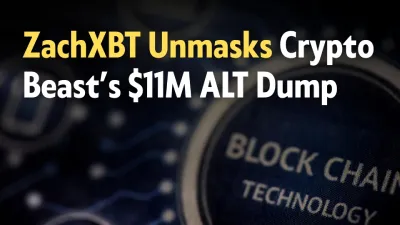简体中文
繁體中文
English
Pусский
日本語
ภาษาไทย
Tiếng Việt
Bahasa Indonesia
Español
हिन्दी
Filippiiniläinen
Français
Deutsch
Português
Türkçe
한국어
العربية
CBEX Exposed as Ponzi Scheme, Thousands in Nigeria Affected
Abstract:Thousands of Nigerians have been defrauded by CBEX, a crypto investment platform posing as a legitimate exchange. The scheme collapsed in April 2025, leaving users unable to withdraw funds.

Thousands of Nigerians have reportedly fallen victim to a large-scale investment fraud carried out by CBEX, a now-defunct digital asset trading platform that masqueraded as a legitimate global enterprise. Operating under the misleading name “China Beijing Equity Exchange,” CBEX lured investors with promises of extraordinary returns, only to freeze user accounts and disappear with their funds by April 2025.
The platform gained notoriety by falsely presenting itself as an affiliate of a well-known Chinese state-run financial institution. However, CBEX had no official connection to the legitimate China Beijing Equity Exchange. Instead, it adopted a classic Ponzi structure: users were enticed with guaranteed 100% returns within 30 days and encouraged to refer others in exchange for bonuses. In reality, new deposits were used to pay off earlier investors, creating a cycle that inevitably collapsed when incoming funds slowed.
CBEX further amplified its credibility through appearances on local media channels and promotional campaigns portraying it as a “poverty alleviation” tool. This strategy successfully attracted thousands of unsuspecting participants across Nigeria, many of whom committed large portions of their personal savings to the scheme.
Initial reports from Nigerian media estimated losses as high as ₦1.3 trillion, or roughly $800 million. The figure was allegedly based on blockchain data showing a large amount of funds associated with a specific Tron wallet, believed to be linked to the platform. However, further blockchain analysis suggested the wallet in question belonged to a mainstream crypto exchange and not CBEX, indicating that the actual losses might be considerably lower. Independent researchers now estimate the loss to be closer to $12 million, although the full extent remains unclear due to the lack of formal investigation results.
As panic set in, numerous users reported being unable to access their funds. CBEX quietly disabled withdrawals in early April, and its website and customer support channels went offline shortly after. Angry investors staged protests in cities such as Ibadan and Lagos, demanding accountability and the recovery of lost funds. Social media platforms were flooded with personal accounts of financial ruin, some involving life savings and education funds.
Local law enforcement has yet to confirm whether a criminal investigation is underway. Regulatory bodies in Nigeria have not released official statements regarding the platform, though pressure is mounting from victims for authorities to intervene.
The CBEX case serves as a harsh reminder of the risks involved in unregulated digital asset schemes, especially in emerging markets where financial literacy remains a challenge and enforcement mechanisms are limited. Despite warnings from global financial watchdogs about the dangers of high-yield investment programs, many users continue to fall prey to fraudsters exploiting the promise of fast profits and financial independence.
For affected users, prospects of recovery remain slim. Like many similar scams, CBEX operated without any regulatory oversight, making it difficult to track down those responsible or initiate legal proceedings. The platforms use of cryptocurrency further complicates restitution efforts, as the decentralized nature of digital assets often puts them beyond the reach of traditional legal frameworks.
Disclaimer:
The views in this article only represent the author's personal views, and do not constitute investment advice on this platform. This platform does not guarantee the accuracy, completeness and timeliness of the information in the article, and will not be liable for any loss caused by the use of or reliance on the information in the article.
Read more

Catch the Latest Update on BotBro & Lavish Chaudhary
BotBro, an AI-based trading platform, became popular in India in 2024—but for negative reasons. Its founder, Lavish Chaudhary, who gained a huge following by promoting it heavily on social media. Since then, he has become well-known, but for many controversies. Let’s know the latest update about Botbro & Lavish Chaudhary.

ZachXBT Exposes Crypto Beast’s $11M $ALT Token Dump Scheme
ZachXBT uncovers Crypto Beast’s $11 million pump and dump scheme, causing $ALT token’s crash and wiping out retail investors. Read the full investigation.

Think Twice Before Choosing UC Markets –Know the Risks
Forex trading has become increasingly complex and risky, especially for newcomers. While the foreign exchange market still offers legitimate opportunities for traders and investors, but investment scams have now become common. Fake brokers are widespread, and spotting them can be extremely difficult . The only way to safeguard your capital is to stay informed and alert. In this article, we’ll break down the red flags of UCMarkets and explain why you should avoid it .

Licence Denied: Tokenize Quits Singapore After MAS Decision
The Monetary Authority of Singapore (MAS) has denied Tokenize Xchange’s application for a Major Payment Institution (MPI) licence, prompting the cryptocurrency platform to cease its operations in Singapore and shift focus to Labuan, Malaysia.
WikiFX Broker
Latest News
Olymptrade Under Fire – Fraud Allegations and Investor Outrage
Hantec Markets Appoints New Executives for Growth in Dubai
Is the Forex Bonus a Genuine Perk or Just a Gimmick?
OctaFX Was Fined $37,000 for Operating Without a License
What Role do signals play in the forex trading?
5 Reasons Why Traders Are Losing Trust in Headway Broker
What WikiFX Found When It Looked Into Vestrado
Hantec Financial: A Closer Look at Its Licenses
eToro Joins Hands with Premiership Women’s Rugby
RM750 Million Lost to Investment Scams in Just Six Months
Currency Calculator


